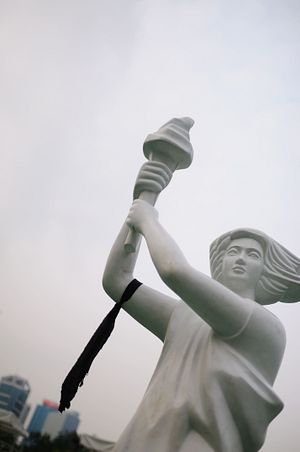The issue of Hong Kong’s political future came to the fore once again on Wednesday as thousands protested, pressing China to allow for full democracy in the city. The protests represent another popular backlash to Beijing’s attempts to control the outcome of the city’s 2017 direct election, as Reuters reports. The protests come less than a month after the official public consultation on the city’s future electoral system opened, according to Channel NewsAsia.
After Hong Kong’s sovereignty was transferred over from the United Kingdom to China in 1997, the city’s relationship with democracy has been strained by Beijing’s attempts to places constraints on who can contest elections. Hong Kong has never directly elected its leader – the chief executive has been vetted by a committee sympathetic to Beijing’s interests. China has assured Hong Kong of direct elections in 2017, but the rules governing participation in the electoral race have angered many Hong Kong citizens who desire freer elections.
The New Year’s Day protestors demanded universal suffrage and a fully free direct election in 2017 with open nominations, allowing any candidates, regardless of their political platforms, to run for office. Under the current constitutional framework, Beijing argues that every nominee “must be endorsed by a 1,200-strong election committee, which is stacked with Beijing loyalists,” according to Reuters.
One of the organizers, Johnson Yeung of the Civil Human Rights Front, says that the protest is intended to “to let our government and the CCP [Chinese Communist Party] know that Hong Kong people need and want a real democracy.”
Reuters reports that the protests over Hong Kong’s democratic future could eventually reach their pinnacle with an “Occupy”-style protest in the city’s central business district.
Since the handover in 1997, the Hong Kong “Special Administrative Region” has been politically and legally distinct from mainland China. The extent of political and civil liberties in Hong Kong is far broader than what mainland Chinese enjoy under the CCP. The so-called “one country, two systems” principle permits Hong Kong (in addition to Macau, and eventually Taiwan, if China gets its way) to govern itself fully, with the exception of foreign affairs and defense.
Xi Jinping has backed Hong Kong’s incumbent chief executive, who has grown increasingly unpopular in the city. Earlier this month, Xi urged Hong Kongers to be pragmatic about political issues: “I hope all Hongkongers will start a pragmatic discussion based on the stipulations of the Basic Law and the decision made by the Standing Committee of the National People’s Congress to forge consensus,” said Xi. Leung Chun-ying, chief executive of the Hong Kong SAR, was in Beijing earlier this month, and Xi that him that Leung and the rest of the Hong Kong administration had been “seeking change while maintaining stability, and putting the people first.”

































